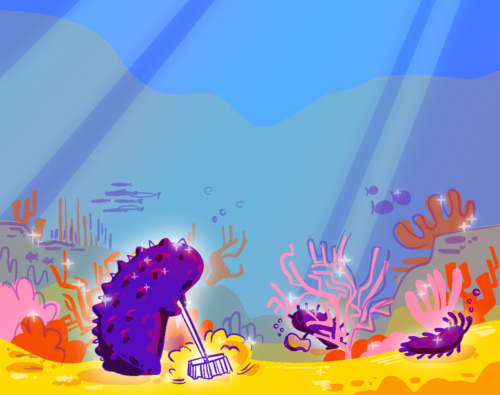Art Courtesy of Annli Zhu
Dirty laundry, expired milk, an unknown rat infestation … every home requires routine cleaning to keep it functional. When this simple task is neglected, the consequences can be unpleasant, hazardous, or even lethal. Just like your home, coral reefs need to be kept clean. Despite covering less than 0.1 percent of the ocean floor, coral reefs are home to a quarter of all marine species on the planet. As oceans become warmer and more polluted, diseases caused by sediment-inhabiting bacteria have rapidly shrunk global coral area. Now more than ever, the reefs need their janitors.
Enter the sea cucumber: a rotund, hand-sized, wormlike creature that dwells on the seafloor. Known as detritivores—literally “waste eaters”—sea cucumbers consume sediment and remove organic matter within it, which often includes disease-causing pathogens. Unfortunately, this symbiotic process in coral reefs has been interrupted in recent decades by the overharvesting of sea cucumbers as a delicacy.
In a recent study conducted in French Polynesia, a team of scientists from the Georgia Institute of Technology demonstrated just how damaging the removal of sea cucumbers can be to a coral reef. Principal investigator Mark Hay, a professor of environmental biology at Georgia Tech, was inspired to conduct this project during a visit to a Fijian museum. An etching from the 1800s depicted a ship carrying many tons of dried sea cucumbers, suggesting that the now-rare creatures were once abundant. Hay wondered how this change could have impacted involved ecosystems.
At the same time, research scientist Cody Clements had been independently studying corals in Fiji, often removing sea cucumbers from reefs just to get them out of the way. He soon noticed that when this happened, the corals seemed more likely to die. Could these detritivores be keeping the reefs alive? “Equally important [as apex predators] are the guys at the bottom of the chain helping you clean up all the waste,” Clements said. “They might be integral to a lot of ecosystems that are falling apart.”
In a stroke of serendipity, Hay and Clements converged on the same question from two directions, and they teamed up to test their hypothesis in Moʻorea, Polynesia. The reefs surrounding this island are home to an abundant population of sea cucumbers. The researchers split the nearby reef into patches, removing sea cucumbers daily from some areas and letting them remain in others. After forty-five days, the differences were staggering. White band disease—a coral disease characterized by a band of exposed skeleton that slowly consumes an entire coral—was fifteen times more likely to kill a coral in patches lacking sea cucumbers than in patches with sea cucumbers. Repeating a similar experiment three thousand kilometers away on Palmyra Atoll with different species of sea cucumber and coral, the team found similar results.
These findings confirmed the scientists’ hypothesis and highlighted the important role sea cucumbers play in reef ecosystems. “The results from this are so clear, and the experiments are so simple,” Hay said. “I’m very confident in the relationship we’ve established.” More than a century of irresponsible sea cucumber harvesting, coupled with an unprecedented rise in pollution, likely catalyzed the destruction of the ocean’s precious reefs. Hay and Clements hope that their research will encourage more sustainable harvesting practices and the targeted cultivation of sea cucumbers to help restore reefs.
Building on top of this work, Hay and Clements hope to identify the pathogen that causes white band disease in corals and learn how sea cucumbers disable it. “Marine diseases are a constant problem,” Hay said. “If humans start getting sick, there is a huge infrastructure that immediately jumps on the problem. If sea urchins or corals start getting sick, people just go, ‘Oh I guess they all died. I wonder what caused it.’ We’re working hard to chase that down.”
Ultimately, revitalizing sea cucumber populations is crucial for protecting the world’s remaining coral reefs, the homes of millions of marine species. In the wake of ever-increasing detrimental human activity and ecological disturbances, these efforts are important for buying time. “Some people might claim that these are just band-aids,” Hay said, referring to the idea that the root cause of climate change is not addressed by cultivating sea cucumbers. “And that might be true. But when you’re slowly bleeding out, you want a bandage.”

